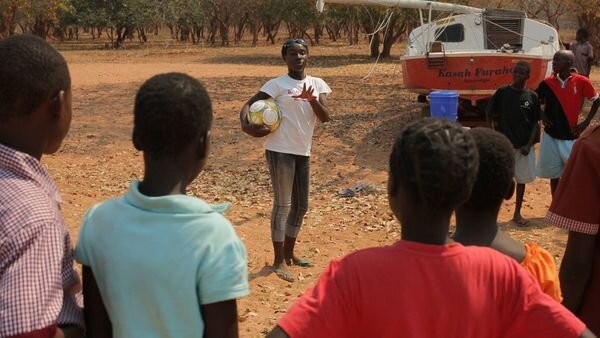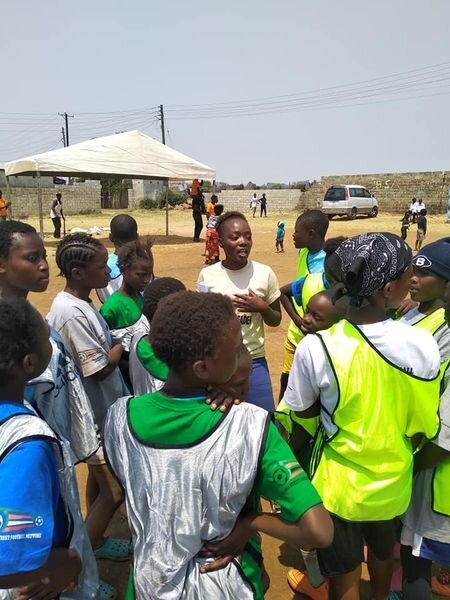
WHM Special: Sport-Aid Development Trust Zambia on Sport’s Role in Gender Equality
March 12, 2021
In honour of March’s Women’s History Month, we are checking in with the 2020 Sport for Gender Equality Collective Impact Award winners. Today, we are featuring Paul Zulu, Founder and Executive Director of Sport-Aid Development Trust Zambia (SADT), who spoke with us about women in leadership, applying cultural and religious contexts to their gender practices and what it’s been like to collaborate with the other Collective Impact winners so far.
SADT uses football and adaptable sports to educate girls on financial literacy through participatory learning. Through their 2020 award-winning Girls Money Savvy Project Through Sport, they incorporate money life-skill drills to educate and inspire their participants, pushing them towards financial independency and entrepreneurship opportunities.
“Equality is about recognising and removing the barriers faced by people involved or wanting to be involved in sport. It is about changing the culture of sport to one that values diversity and enables the full involvement of disadvantaged groups,” says Paul.
Going beyond just addressing gender equality in sport, SADT also addresses access to education, entrepreneurship and employment that will enhance their girls’ livelihoods as key targets. This is based on the belief that these valuable life-skills can be taught through sport and transferred to different spheres of life, eliminating further gender equality barriers.
Paul feels that UN Women’s 2021 International Women’s Day theme, Women In Leadership, was a reminder to us all to create deliberate actions that will ensure that girls and women are encouraged to take up leadership at all levels. "As sport for development practitioners, we must ensure that safer spaces are created that will allow more girls to participate and learn skills that are transferable to other leadership settings off the pitch."

Supported by Comic Relief and the BT Supporters Club, including grant funding and a comprehensive business support package, the four Collective Impact Award winners - from across East and Southern Africa - were selected to work together over one year. They are benefitting from each other’s individual expertise, sharing best practice and working through issues in real-time to drive real, sustainable impact through sport.
Paul shares that the group workshops facilitated by our sister consultancy, thinkBeyond, have created a learning platform for their organisation and amplified their implementation strategies. They have also been exposed to different experts in the field of Gender Equality and Sport for Development, which has led to new innovations on how sport can be used to enhance gender equality.
“These innovations have helped us to strategize on how we are planning for activities, implementing and evaluating activities. The best example for this is the Gender assessment tool that Soccer Without Borders [Uganda] shared that enabled us to evaluate ourselves as the organisation, our implementation approaches and how we are engaging girls and boys at different levels.”
Paul also shares that this tool unveiled certain realities that previously weren’t paid attention to as they aren't as common in Zambia as compared to other parts of East Africa. Christianity is the dominant religion in Zambia, whereas Islam is more prevalent in other parts of East Africa. These two religions are bringing in different cultural-religious context that affects girls differently as they participate in sport.
With the outcome from the Gender Assessment Tool, SADT now plans to do create a strategic plan to respond to the cultural and religious barriers that affect girls' and women’s participation in sports.
“Christianity does not have very stringent rules on dressing in regard to girls, while Islam requires the girls to dress up in a specific cultural-religious accepted way, e.g. wearing a veil and long dresses. This kind of dressing can impede girl’s freedom and participation in sport. Therefore, the tool has helped us appreciate this difference in cultural and religious context between Southern and Eastern African regions.”
Watch Paul’s 2020 Beyond Sport Global Awards Campaign interview with Sports Anchor and Presenter Motshidisi Mohono here.